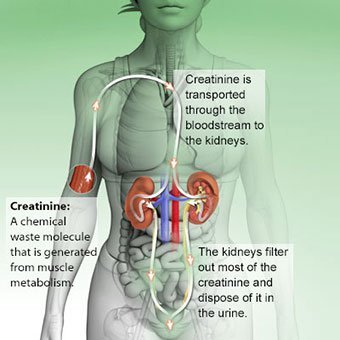Photo

Why are blood creatinine levels checked?
The kidneys maintain the blood creatinine in a normal range. Creatinine has been found to be a fairly reliable indicator of kidney function. Elevated creatinine level signifies impaired kidney function or kidney disease.
A more precise measure of the kidney function can be estimated by calculating how much creatinine is cleared from the body by the kidneys. This is referred to as creatinine clearance and it estimates the rate of filtration by kidneys (glomerular filtration rate, or GFR). The creatinine clearance can be measured in two ways. It can be calculated (estimated) by a formula using serum (blood) creatinine level, patient's weight, and age. The formula is 140 minus the patient's age in years times their weight in kilograms (times 0.85 for women), divided by 72 times the serum creatinine level in mg/dL. Creatinine clearance can also be more directly measured by collecting a 24-hour urine sample and then drawing a blood sample. The creatinine levels in both urine and blood are determined and compared. Normal creatinine clearance for healthy women is 88-128 mL/min. and 97 to 137 mL/min. in males (normal levels may vary slightly between labs).
Blood urea nitrogen (BUN) level is another indicator of kidney function. Urea is also a metabolic byproduct which can build up if kidney function is impaired. The BUN-to-creatinine ratio generally provides more precise information about kidney function and its possible underlying cause compared with creatinine level alone. BUN also increases with dehydration.
Recently, elevated creatinine levels in infants were associated with bacteremia while elevated levels in adult males have been linked to incresed risk of prostate cancer.
0 notes